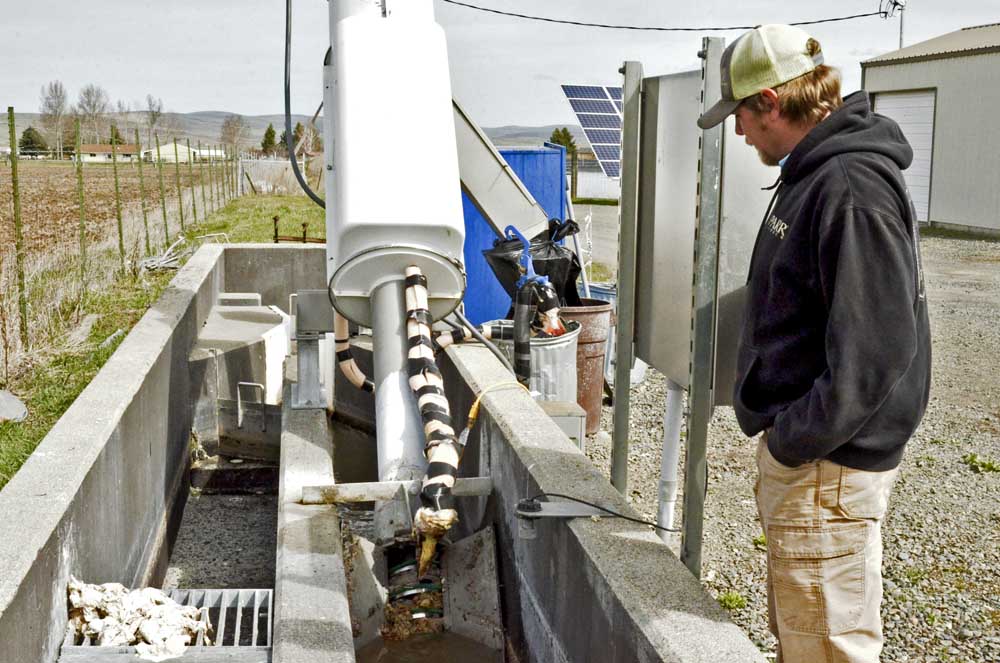Unflushable flusables clog county treatment plants.
Published 4:39 pm Monday, April 27, 2020

- Joseph Wastewater Treatment Plant operator Levi Tickner watches as unflushable materials are pulled from the effluent for disposal at the landfill. Tickner said there has been a bit of an increase in items ending up at the plant such as supposedly flushable wipes as people are often using “flushables” instead of toilet paper. Although many wipes are marketed as “flushable,” they often clog sewer pipes and end up here, not breaking down as does toilet tissue.
In these days when toilet paper is absent or at least worth fighting over, desperate grocery stores stock packages of moist, flushable wipes on empty T.P. shelves, and people are taking extra care to sanitize because of the coronavirus pandemic, many of the items labeled “flushable” are anything but, say some sewage treatment plant operators in Wallowa County.
Enterprise Public Works Director Ron Neil said the city is having some problems, much like cities all over the country.
“We’ve had some issues, but not like some of the bigger cities,” Neil said.
The city ran a public service announcement on local radio recently asking city residents to be careful about what went down the toilet.
“People need to be aware that when they flush down their line, it affects all the lines,” he said.
The Enterprise plant has about 1,300 sewer connections, and regularly handles about 300,000 gallons of effluent a day. It has a capacity of 750,000 gallons. The system has one lift station on the west side of town and five pumps at the plant.
“Items that are labeled ‘flushable’ may go down, but they get hung up in sewer lines,” Neil said. “We haven’t had any real blockages in the main lines, just at some of the pump stations.”
Dave Wilkie, Enterprise’s wastewater treatment plant operator, said that in today’s environment, the potential that workers get contaminated is greater.
“With this COVID-19 thing that’s going on, it’s making it more vulnerable for the employees to empty” clogged sewer lines, he said.
“We just ask people to be conscious of what they’re putting down their toilets,” Wilkie said. “It all goes down the drain,” he said, although some doesn’t necessarily go as far as it should.
Unlike toilet paper, he said, flushables don’t come apart very easily. “You ever try to tear one of those baby wipes? They don’t tear and they can clog the lines.”
Wilkie urged residents to put “anything but toilet paper” in the trash and not the toilet, particularly wipes and feminine hygiene products.
The Joseph system, which is smaller — about 650 connections and usually about 125,000 gallons a day — is a gravity-fed system with no pumps where “flushable” items can get caught.
Joseph’s wastewater treatment plant operator Levi Tickner said the system has a capacity of handling about 390,000 gallons of normal effluent a day and can go as high as 440,000 gallons of lighter effluent.
Both systems have a “rag-removal system” as one of the first stops for effluent on its way to be treated. That system uses a corkscrew augur that removes items larger than one-quarter inch in diameter from the liquid, compresses and pumps them into a barrel, which is taken to the county landfill. It becomes “essentially, dry rags,” Tickner said.
“They’ll bind it up and we’ve usually got to remove them by hand,” he said.
Some such items as disinfectant wipes and feminine napkins can cause clogs near the homes where they’re flushed before they even get to the plant, he said.
With the state parks closed, the city is handling a bit less effluent but Tickner expects the amount to increase as tourist season gets underway — assuming there is one.
“People flush their toilets and everybody thinks it goes away,” he said. “But it doesn’t; it comes here.”
The city of Wallowa seems to be the exception, said Mayor Gary Hulse. He said there hasn’t been much difficulty there.
“There are a few more disposable wipes that should go into the garbage, but we haven’t had a lot of problem with them,” he said.
Hulse estimated the city has about 500 connections, but he did not know how many gallons a day the gravity-fed system regularly handles. There is one pump that brings effluent from the east side of the Wallowa River.
“People seem to be self-isolating and are being real good about it,” he said. “Right now, we’re just trying to get through it.”





